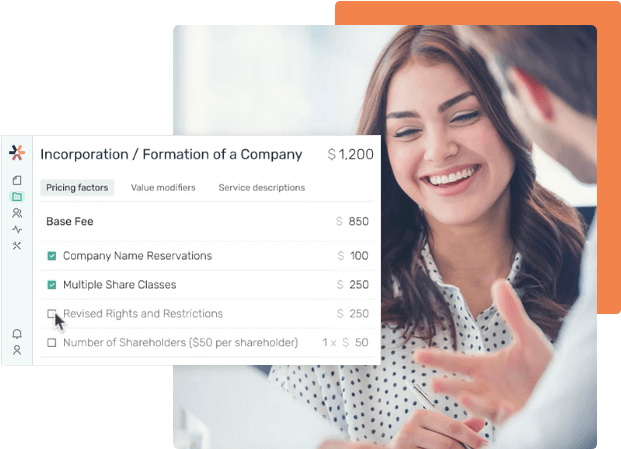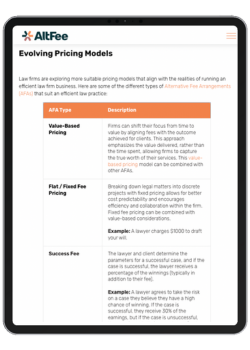- Resources
- Everything to Know About Using a Lawyer App in Your Firm
Table of Contents
Over recent years, digital workplace apps have started to rise in the legal industry. These applications help legal firms facilitate interactions and communication among team members and clients.
But while mobile software makes work possible from nearly any device, it’s not all sunshine and rainbows. In fact, according to the ABA 2019 Legal Technology Survey Report, 72% of legal experts utilize mobile tech apps to report to work. But while these applications offer increased convenience, the same survey also revealed that 95% of legal professionals felt the need to report remotely to work while on vacation or otherwise on their “off” time.
The legal industry has been fighting for better work-life balance for decades. While forward-thinking firms have embraced things like alternative fee arrangements to eliminate the stress and pressure that comes with hourly billing and provide a better client experience, inclusion of legal technology has both improved and hindered the quest for better work-life balance for legal professionals.
This article outlines the benefits and challenges with lawyer applications, outlines the different types of apps available, and provides tips on choosing lawyer apps that work for your firm.
Benefits and Risks with Legal Apps
Attorneys are often on the go, whether it be travelling to court or to meet with a client. This means that they need the tools to support them while they are away from the office. This is why many legal SaaS companies provide lawyer apps that support mobile devices.
But like any lawyer app, there are benefits and risks your firm should be aware of. Below is a comparison of the benefits and risks of lawyer apps:
|
Typical Benefits of a Lawyer App |
Potential Risks with a Lawyer App |
|
|
The Benefits
Legal applications are meant to improve the productivity of lawyers and law firms by offering functionality that improves processes. Let’s take a closer look at the benefits that a typical lawyer app can offer.
Automating Repetitive Tasks
Every day, legal professionals face a plethora of tasks they need to accomplish. At the same time, lawyers have to meet with clients, perform research on cases, go to court, and much more, shifting the priority of tedious administrative tasks to the bottom of the list.
Legal technology applications can automate some of these tasks to save lawyer time. For instance, by connecting legal practice management software with a contract or document creation application, client information can be filled out automatically in the correct places in the document without the lawyer having to do it manually. This not only saves time, but significantly reduces entry errors.
When AltFee is integrated with Clio, client information that’s changed in Clio is automatically updated in AltFee, ensuring that client information is the same within both systems. This means that client pricing matters will always have the correct client information attached to them, rather than someone having to manually update AltFee when a change is made in Clio.
While this is just one example, there are limitless ways that a lawyer app can save time and reduce or eliminate repetitive manual tasks.
Eliminating a Disjointed Tech Stack
Many lawyer applications can integrate with each other, providing seamless information transfer throughout your law firm’s tech stack. Instead of a lawyer app living in it’s own silo, connecting it with your other applications allows it to function while considering the information and functionality of the applications it’s connected to.
For example, integrating practice management software with a cloud-based software suite like Google allows tons of added functionality, from easy scheduling through Google Calendar, to providing email-based notifications when an invoice is overdue.
These types of integrations remove the issue of a disjointed tech stack, and keep legal teams organized.
Anywhere, Anytime Access
Utilizing lawyer apps means increased accessibility for your firm. Since most lawyer apps utilize the cloud, information can be accessed from anywhere using any device. This means that emergency meetings can be attended without having to go physically on-site, and documents needed for court can be accessed without attorneys having to print and carry physical documents.
Develop Stronger Attorney Client Relations
Legal technology has played a large role in helping attorneys and clients better communicate with each other. As a result, according to the Clio 2022 Legal Trends Report, clients have higher expectations regarding the technology their law firm uses. For instance, the report states that video calls are a preferred option for clients when speaking with their attorney. Also, more clients want the ability to pay for their legal services online rather than in-person.
With higher expectations regarding legal technology from clients, it makes sense that a firm that wants to be more client-centric would invest in adopting more tech to facilitate better communications, easier payments, and more for their clients.
Caveats and Risks
Alongside the benefits of lawyer apps come several challenges you should be aware of. Knowing these can help you adjust and adapt to the software, so you can generate ways to overcome issues when they arise.
Here’s a closer look at a few of those risks and how to deal with them.
Lost Investment and Time
While lawyer apps can give you a mountain of benefits, losing time and money involved with the investment is a common risk. This is especially true when you don’t research what apps will work for your firm.
Navigating the plethora of legal apps available can be difficult, leading to firms just choosing the most popular option. Especially for smaller law firms, the investment into a market-leading lawyer app might not result in the ROI they were expecting. It’s like purchasing a full subscription to the entire Adobe creative suite, but you only really needed Photoshop. This is why it’s worth it to take a look at all available options, use comparative review websites, and consult with colleagues in your network as part of your research process—you might find a hidden gem of a lawyer app that meets the needs of your firm without breaking the bank.
Along the same vein, legal teams could find themselves incurring increased training costs on overly complicated apps that they didn’t initially expect. Training costs can be tough to calculate to the dollar, but understanding the tech-savviness of your legal professionals and comparing that to the overall intuitiveness of the lawyer app can give you a good time and money investment benchmark.
Finally, legal teams that don’t properly look into an app before purchasing it might find that the app isn’t compatible with their current tech stack. As a result, they’d either have to do a major tech overhaul or find a new app, leading to double investment in the same tool.
Off-The-Clock Work
Convenience is one of the best things lawyer apps can offer. But it can also be a risk. Because apps are readily accessible through mobile phones, the line between work-life balance can be diminished, adding to a legal professional’s workload when the original aim was to reduce it.
Boundaries need to be set for lawyer applications in advance to maintain a firm’s commitment to work-life balance. This will have to be done by the attorney with every client they work with. Making their working hours clear to the client and letting them know the timeframe where they can expect responses to messages goes a long way. When boundaries are set, the client won’t expect immediate responses to after-hours messages.
Another potential boundary is ensuring that legal professionals don’t put work applications on their personal devices. This means that at the end of the day, attorneys can simply turn off their work phone or computer and be less inclined to deal with notifications until the next day. Some apps, such as Slack, allow you to silence notifications so that you don’t have to log out of the platform in order to avoid getting notifications and forcing you to stay connected even after work hours.
Common Types of Attorney Apps for Legal Professionals
There are a wide range of lawyer apps available, all with the aim to add productivity and convenience to a law firm’s processes.
Below you can find types of attorney apps with their corresponding purposes for legal professionals:
|
Attorney Application |
Example |
|
Client Intake and CRM |
Clio Grow |
|
Law Practice Management |
Clio Manage |
|
Pricing |
AltFee |
|
Billing |
TimeSolv |
|
Document Management |
MyCase |
Client Intake and CRM
When you have a solid case management system and CRM platform, all data about your clients can be stored in one place. This makes it easier to browse through what you need, which can save both time and effort.
Legal CRM platforms also eliminate the need for manual data entry through integration with client intake software for lawyers. Once again, this can save time for legal professionals and free-up capacity to work on other tasks.
Finally, by implementing a client intake system, legal teams can reduce the amount of physical paperwork in the office. This helps reduce the opportunity for key documents to go missing and helps improve organization within the firm.
A perfect example of a robust app for client intake and CRM is Clio Grow. Clio Grow is designed to help you grow your law firm by improving intake processes and scheduling and making it easier to onboard new clients. Clio Grow can help you with the following processes:
- Automation of intake processes to get downloadable and shareable forms and store them in a secure cloud
- Automatically schedule consultations through Clio Scheduler
- Manage payments online through Clio’s effective payment integration system
- Streamline daily tasks to prevent duplication errors
Law Practice Management
Law practice management software automates all relevant tasks you need for your firm. It promotes efficiency in creating a system that can handle everything, including the following processes:
- Timekeeping
- Email organization
- Document and case management
- Billing and payments
- Scheduling and creating calendars for upcoming events
In addition to this, law practice management software helps streamline processes and keeps them consistent within the firm. This, in turn, leads to a better client experience because it’s much smoother and better organized for the client.
Many legal firms prefer Clio Manage because of its ability to automatically run your firm while organizing cases and establishing outstanding lawyer-client collaboration. Clio Manage can perform the following tasks for your firm:
- Increasing efficiency through automation
- Comply with regulatory standards through its outstanding financial tools
- Cater to a more client-focused experience, promoting flexibility and convenience
- More seamless online transactions
Pricing
Another common type of software that legal teams can implement include pricing software, which helps legal teams create tightly scope and price client projects before commencing any work.
This is particularly important for teams implementing non-hourly billing structures through the use of alternative fee arrangements (think fixed fees, portfolio fees, success fees, contingency fees, etc.). In this context, legal teams need to be able to create pricing structures for each client’s unique situation in a way that aligns with both the client’s and the firm’s goals. Pricing software can help teams do that easily and consistently, reducing error in the process, all while capturing pricing learnings for future consideration.
One such pricing software that legal teams can turn to is AltFee. AltFee features organized pricing guideline templates by practice area where legal professionals can collaborate with their colleagues and come up with the best legal pricing option for each client matter. This legal software program helps firms align the interests of the legal team members and firm leaders.
Start Earning More Revenue with Fixed Fees
Break free from hourly pricing and take the fear out of scoping and pricing client projects to start maximizing profitability.
Book A Demo
Billing
Billing software helps legal teams track time to determine how long certain legal matters take. Over time, they can use that information alongside other factors to further optimize pricing structures for each legal matter that they handle.
TimeSolv has helped various legal professionals increase their overall billable time. Plus, it also helps firms get paid faster. As one of the oldest legal software programs in the market, TimeSolv features unique, comprehensive, and practical systems that promote convenient billing and time-tracking.
Document Management
Time management and law firm operations are enhanced when you have the right document management system.
Document management apps are often cloud-based software. Because document management is cloud-based, anyone can access data whenever and wherever. That makes it easier for remote employees to access these types of documents and to collaborate with colleagues on them.
Document management apps also sometimes have document automation that can speed up manual processes. Things like requesting client signatures or creating document templates can save time and enhance productivity.
Apps like MyCase work with small to mid-sized legal firms to take care of their documents and ensure they are organized inside the cloud. Aside from document management, MyCase is also capable of calendaring management and accounting functionalities.
How to Find the Right Lawyer App
In order to choose the right lawyer app for your firm, there are a few key steps that you need to take, as well as several factors you need to consider.
When you know what factors to consider, it’s easier to dial down your choices and choose one that will work well with your company’s goals, team members, and client expectations.
Let’s go over a few of those factors and why they matter in determining the right legal app for your team.
Weigh Your Options
First, perform thorough research of all your options:
- What do these apps have that sets them apart from their competitors?
- How can these software programs speed up your firm’s current operations?
- What will be required for onboarding?
- Are the apps compatible with the law firm’s current tech stack?
These are essential questions to ponder when weighing your options.
Additionally, you also need to consider your clients. What do they need, and how can you provide it for them? Remember, lawyer apps are not only for legal professionals but also for your clients. Many of them were created to centralize client-based experiences and make them feel more confident about working with your firm.
Consider Budget
After weighing your options, don’t forget to consider your firm's available resources. Naturally, these apps come with a price so you can enjoy the totality of their features.
Part of considering your budget means balancing the different features of each app with their price. It’s important to look at how the features outweigh the cost and whether they really provide value to your firm.
After you’ve figured out which features you need, choose an app that meets those needs at the lowest possible price point without sacrificing quality. This will help you stay on budget without sacrificing functionality.
Ease of Use
When searching for a lawyer application, consider its ease of use. Check whether it features an intuitive interface that can offer a user-friendly experience.
The easier an app is to use, the more likely it is that teams will use them instead of turning to old, outdated processes. This helps reduce common issues like lost time or lost investment on the app.
Current Software & Tool Compatibility
Choosing an efficient lawyer app also means you need to be aware of your firm’s current legal software and available tools. The lawyer app you intend to use should be compatible with your firm’s current tech stack.
Make sure, before purchasing any app, that you won’t need to do any major overhauls or hefty manual integrations of the app with your current tools. Otherwise, your team will have to invest even more time and resources into the purchase than initially budgeted, driving up the cost and reducing the app’s value.
Tips for Seamless Lawyer App Integration
After choosing the right lawyer applications for your law firm, it’s time to integrate them into your operations. Here are some tips for doing so.
Provide Training
Training helps establish workflows with lawyer applications. Onboarding should be provided by the application vendor if necessary, but law firm management will need to provide specifics on how they expect each lawyer app to function so that an effective onboarding plan can be created.
Establish a Change Management Plan
When your firm relies on apps, remember that management plans will work differently. This is why you must establish a new management plan that will work seamlessly with your firm. The following are essential strategies you can formulate for a successful management plan:
- Identify your goals with the lawyer apps
- Establish how communication channels will be created together with your chosen application
- List potential challenges you might face with the app and how you can overcome them
Consider Using a Software Consultant
Dealing with automated apps means the risk of facing possible challenges daily. That’s why having an expert in the digital field is essential to help you overcome issues and continue your daily operations.
When problems, especially tech issues, arise, the software consultant will do everything they can to return your operations to normal. Software consultants can also help decrease complexities with legal applications because they can demonstrate everything for you easily.
Moreover, software consultants have a higher degree of technical knowledge. They can share their experiences in your firm so that it’s easier to get used to your available legal applications.
Conclusion
With technology on the rise, legal firms should leverage various attorney apps that make their lives easier and more convenient. These applications allow clients to experience seamless transactions through document management, online billing and payment, time-tracking, and more.
Choosing what law apps to utilize also means considering various factors, including:
- Your options
- Your budget
- Complexity and user-friendliness
- Compatibility with your current tech tools and software
When your firm is new to tech, conducting training can help make your lawyer app integration more seamless and convenient. Moreover, getting someone to onboard new software or act as your integration expert can ensure you stay up to date with best practises for your app system.
If you’re looking to improve your scoping and pricing, AltFee is a great collaborative flat fee system that allows integration with other lawyer software like Clio. In this instance, contact detail changes in Clio will automatically update in AltFee, saving you time and giving you peace of mind! Schedule a free demo today to learn more.
Start Earning More Revenue with Fixed Fees
Break free from hourly pricing and take the fear out of scoping and pricing client projects to start maximizing profitability.
Book A Demo



Newsletter Signup
Subscribe to our newsletter to receive the latest news.







